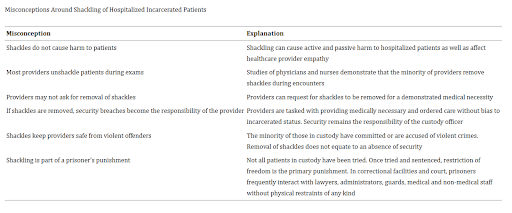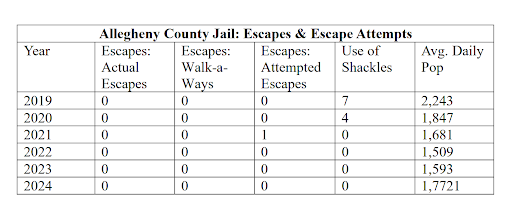Allegheny County Council Votes 12-2: No leg shackles at ACJ!
November 21, 2025
On November 5, Allegheny County Council members soundly defeated a petition to reinstate the use of leg shackles for county jail corrections officers to use in the medical transport of sick, injured, or pregnant individuals. The petition was a repugnant attempt to undo a 2021 voter referendum in which an overwhelming majority of county residents voted to prohibit solitary confinement as well as the use of leg shackles and other torturous devices at the jail. The council vote was a decisive 12-2 (one council member was absent), with yes votes only from Democratic council members Jack Betkowski and DeWitt Walton.
“The vote was a resounding rebuke of the corrections officers (COs) effort to reinstate shackles,” said ALC staff attorney Jaclyn Kurin. “Hopefully, it will deter them from attempting any other legislative efforts that would usher in worse conditions or other dehumanizing practices at the jail.”
In May 2021, 168,907 county residents voted in the primary election to prohibit the jail’s use of solitary confinement except in cases of facility-wide lockdowns, medical emergencies, and protective separation requests. The referendum also banned the use of leg shackles, chemical agents, and restraint chairs under any circumstances. The referendum passed with about 69.5% of the vote.
The vote followed a campaign by ALC and other organizations to raise awareness about growing violence by corrections officers against people detained at ACJ. About 80% of the people at ACJ are held pretrial or are there for technical probation violations, and have not been convicted of any crime. A significant portion of those who are convicted are there for misdemeanors. Yet from 2015 to 2019, CO’s Use of Force (UOF) incidents nearly doubled from 414 to 720 even though the jail’s average daily population decreased. In 2019, ACJ had more uses of force than any other jail in Pennsylvania—by far. That year, In 2019, ACJ used the restraint chair 339 times, which was almost four times more per capita than the rate for all other jails in Pennsylvania. In contrast, all five Philadelphia jails combined did not use the restraint chair on a single occasion in 2019. Chemical agents use at the jail more than doubled from 50 in 2015 to 122 in 2019 (an increase of 144 percent). The use of stun guns/tasers went up more than three-fold from 41 to 146 in that time period (an increase of 256 percent). Taser use was approximately 12 times more on a per capita basis than all other jails in the state. In Pennsylvania, which has 67 jails, ACJ alone accounted for a full 50% of all uses of tasers in 2019. While the total number of UOF incidents, use of restraint chairs, use of chemical agents and the use of the stun gun/taser all decreased between 2019-2020, their per capita use stayed about the same, far above the rest of Pennsylvania’s jails.*
The majority (75 percent) of those held at ACJ have a mental health or substance abuse disorder, according to a 2019 University of Pittsburgh report, and nearly half (48 percent) have both. Our litigation has found that those with psychiatric disorders are frequent targets of violence by ACJ COs. So in 2020, ALC, along with Pennsylvania Institutional Law Project (PILP) and Schnader Harrison Segal & Lewis LLP, filed Howard v. Wililams, a federal class action lawsuit on behalf of people with psychiatric disabilities incarcerated in ACJ. The lawsuit alleged severe and systemic constitutional violations, as well as violations of the Americans with Disabilities Act, for the jail’s failure to provide adequate mental health care, and its discriminatory and brutal treatment of people with psychiatric disabilities. An agreement in the case was announced and approved by the court in 2024. The landmark settlement demanded substantial changes that would impact all people with psychiatric disabilities held at ACJ, present and future.
This clear judicial determination of unacceptable and inhumane violence at ACJ was followed in early 2025 with the appointment of a new warden at ACJ, who pledged to continue the work of the voter referendum to undo the culture of violence at the jail. And yet within months, the president of ACJ’s corrections officers union, Brian Englert, with the support of county resident John Kenstowicz, began an attempt to undo this progress with the petition to overturn the 2021 ban on leg shackles. They alleged the shackles were needed to “protect public safety” during the transport of people held at ACJ to outside medical appointments.
ALC staff and volunteers and other community members provided testimony opposing this deeply misguided and bad faith attempt to overturn the will of county voters. ALC organizer Tanisha Long told council, “this is an effort by two people who believe they know more than people who make policy, people who are inside the jail, formally incarcerated people, jail oversight board members, the warden himself, the county executive, and yourselves.”
ALC Court Watch volunteer coordinator Airi Tilley testified about the inhumanity of shackling vulnerable people in medical distress. “Every time I go to court, I see people’s loved ones shackled from their legs to their hands, shuffled into nearly empty courtrooms. Often, I witness the pain and dehumanization of seeing someone you love in that state. Just last month, I saw multiple cops struggle to pick someone up as they fell face first while wearing shackles. If jail staff require extreme restraints to move someone receiving medical care, that doesn’t show a need for more shackles. It shows a failure in training and leadership, and an extreme level of incompetence.”
ALC Court Watch intern Kayla King, a Summa Cum Laude graduate at the University of Pittsburgh Criminal Justice and Law Program, gave public comment on the leg shackles petition, , “Where we focus on evidence-based practices in corrections and law enforcement agencies, anecdotal stories – tales from corrections officers – do not, cannot, and will not outweigh the mass of evidence that attest that leg shackling during hospital transports is largely unnecessary. Medical staff can and will utilize leg shackles. That is their prerogative as a hospital or medical practitioner. It is not standard practice for jail and correctional facilities people to do this.” A 2022 Journal of Internal Medicine article, “Shackling in the Hospital” makes clear that when people do arrive in leg shackles, their use is harmful and unnecessary from a public safety perspective (see Table 1).
Table 1
Prior to county council’s vote on the petition, council member Dan Grzybek spoke to his wife’s experience as a nurse and advised that she and other health care workers he spoke with prefer to have the oversight of using soft and hard leather restraints so that they can best treat their patient. “They can make sure that they themselves are safe, they can make sure the patient is safe, and they can make sure the patient is appropriately restrained.” He also reminded other council members and the public that “the incarcerated individuals who are taken to the hospital do have handcuffs on. They are escorted by two COs at all times who are equipped with tools to make sure that they do not escape.”
Fellow council member and vigilant Jail Oversight Board member Bethany Hallam also reminded council members of data ALC had previously provided on escape attempts from ACJ. Since 2019, there has been only one attempted escape, and none in the years following the ban on leg shackles (see Table 2). The numbers clearly belied the petition authors’ claim that the return of leg shackles were necessary for public safety.
Table 2
Many other community members showed up demanding the ban on leg shackles remain in place. They made clear they wanted council members to vote NO on torturing our incarcerated neighbors, NO on ignoring our votes, NO on inhumanity, and NO to the return of leg shackles at Allegheny County Jail.
The defeat of the petition comes thanks to the work of community members, our formerly incarcerated friends and neighbors, their family members, and organizations like 1Hood, PIIN, BPEP, TAAG, and APA, and especially the leadership of county councilwoman Bethany Hallam.
* Our use of force and escapes data comes from the extraordinary occurrence reports that the PA department of corrections publishes annually. All ACJ data is self-reported i.e. ACJ leadership has reported the data to the DOC on a monthly and annual basis.


